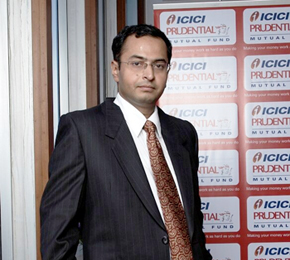He has been earlier associated with the AMC for the period July 2004 to October 2009 as Co-Head - Fixed Income. In his earlier he was responsible for managing 8 debt funds with primary responsibility on Govt. Bonds and Corporate Bonds trading and involved monitoring of the factors like key economic developments, market liquidity, forex movement etc. He has been a key contributor to our success on the fixed income side in the past.
He has an overall work experience of around over 17 years. In his previous role with Standard Chartered Bank, he was a Senior Rates Trader & Head of Primary Dealership Desk.

Rahul currently manages 8 funds at ICICI Prudential i.e. ICICI Prudential Liquid Plan, ICICI Prudential Flexible Income Plan, ICICI Prudential Floating Rate Fund, ICICI Prudential Banking & PSU Debt Fund, . ICICI Prudential Medium Term Plan, ICICI Prudential Gilt Fund(All Options). ICICI Prudential Multiple Yield Fund, ICICI Prudential Capital Protection Oriented Fund.
Rahul hold a Bachelors degree in Science and an MBA from Bhopal University. Besides Standard Chartered Bank he has worked with various other organizations like Franklin Templeton, UTI Bank, SMIFS Securities, Khandwala Finance Ltd and RR Financial Consultants.
Rahul loves reading and is a keen follower of Formula 1 and tennis.
1. Do you believe that the current instability in the Euro zone would lead to a stronger appetite for bonds? In what range do you expect the 10-year corporate bond yield to settle at in the next three to six months?
Ans. The current instability in euro zone can potentially impact the trend of risk trade gaining momentum. This in turn could lead to more investor’s flight to safety and fixed return instruments which can spell positive for bonds.
In the near term 10-year corporate bond yield depends on the stance taken on rate cuts by RBI in the impending credit policy. In absence of any further rate cuts, the most likely scenario is for corporate bonds to remain in the range of 9 %, for the next 3 -6 months. Also the current spreads on government securities is on the lower side, hence, if 10 year benchmark G-sec stays at the 8 % level, it will be difficult for 10 year benchmark corporate bonds to sustain much below 9 % until there further monetary easing by the RBI.
In the scenario of a rate cut, there is potential for corporate bonds to move down by about 20 from current levels. The market will therefore closely look for future rate guidance from RBI.
2. What are your views on liquidity in the Indian corporate bond markets? What measures are undertaken at ICICI Prudential Asset Management to avert risks arising from illiquid securities?
Ans. The government and regulators are all willing to take further steps in order to create liquidity in the Indian corporate bond market. However, while we are seeing some improvement on a gradual basis, there is still a long way to go. Some of the challenges have been that the repo market in the corporate bond side is yet to pick up as expected. Also, unlike G-secs, there are an extraordinarily large number of issuances from the same corporate in the same tenor thereby impacting the ability to take trading calls.
At ICICI Prudential AMC we have a framework that works on the principle of SLR i.e safety, liquidity and then returns. Aligned to this the first priority in buying corporate bonds is safely, liquidity followed by returns. We continue to hold majority of our portfolios in liquid segment of the corporate bond market thereby mitigating safety/ liquidity driven risk on the portfolio.
3. Does the fund house see inflation and consequently interest rates softening in the near future? Based on this view, should investors move funds to the short term or long term bonds?
Ans. While we do not see any significant upside risks on the inflation front, we expect inflation to be hovering at around 7.5% for the next 3 - 6 months. Inflation therefore continues to present RBI with the biggest challenge and thereby impede rate action. It is therefore a tight rope walk for the RBI on managing both inflation and growth dynamics. However, to revive investments and to improve the growth prospects going forward, we expect RBI to take some calibrated monetary easing. Given that the rates have peaked, investors should definitely increase their portfolio allocation to log term bond funds.
4. What is your view on debt funds following a credit opportunity strategy? Which of the debt funds managed by ICICI Prudential Asset Management follow such a strategy in whole or in part?
Ans. As mentioned earlier, aligned to philosophy of SLR, our focus is on ensuring safety. Within this matrix, we look at capitalizing on a credit opportunity when we opportunistically able to find a good risk reward ratio. On a standalone basis we are very selective as far as credit opportunity is considered given that we manage money in fiduciary capacity.
5. With improving liquidity in the system, should investors expect a change in the returns delivered by ultra short term bond funds? What are the other cues, that investors should keep an eye out for, which would affect the performance of liquid and ultra short term funds?
Ans. With liquidity improving in the system, that is definitely adding to more availability of money in the market. Also market is confident of RBI’s ability to keep liquidity at comfortable levels at RBI’s comfort zone of 1% +/- NDTL. This is the primary reason for the extreme shorter end of the curve to be gradually coming down. If there is further easing of monetary conditions, liquid funds could potentially see further gradual decline in yields. However, this on the other hand will benefit funds which have higher duration like the short term income plan, regular savings plan, dynamic bond fund etc.
6. What are the key factors that a retail investor should keep in mind while investing into a debt fund? Which funds would you recommend to retail investors?
Ans. We will always advice investors the same investment strategy as we follow in our portfolio construction that is to first focus on safety, liquidity and then return. Further their investment decision should be aligned to their risk appetite and investment horizon. The current scenario where interest rates seems to have peaked and have a downward bias provides an opportunity to benefit from investing in fund with higher duration like the ICICI Prudential Income fund , ICICI Prudential Regular Saving Fund ,ICICI Prudential Corporate Bond fund etc.


